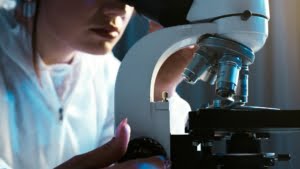Lister Fellow Chris Stewart has received the 2023 WH Pierce Prize for microbiology in recognition of his work on infant health and its relationship to the microbiome. Chris is especially interested in how microbiological research can help improve neonatal health, for example by helping to prevent NEC (necrotising enterocolitis), a devastating infection that affects newborns. We caught up with him to chat about the prize and his research.
Q: What did it mean to you to receive the WH Pierce Prize? Were you expecting it?
A: A couple of years ago Professor Tracy Palmer, a colleague at Newcastle University, asked if she could nominate me for this prize. At the time I thought “sure, but I am not going to win”. Honestly, that she even thought to put me forward and took time from her busy schedule to nominate me meant so much. Winning was only ever a bonus.
After 2 unsuccessful years, including being shortlisted in 2022, I was very surprised to win the 2023 WH Pierce Prize. Although this is an individual prize, it undoubtedly reflects the wider team that I am fortunate to work with, including my research team and collaborators, as well as all my mentors and friends in the field who have encouraged and supported me over the years.
Q: Do you have any activities planned following receipt of this award?
A: Working with Applied Microbiology International (AMI), I will host a webinar which will feature live talks and Q&As with leading researchers I have hand-selected. I am really looking forward to this event and I am sure I will learn a lot. The details are still being sorted with the event scheduled for March 21st. Watch this space!
Q: Has microbiology always been your passion? How did you get interested in this area?
A: Growing up I was not especially studious and much preferred being outside and playing sports. I always envy the people that loved microbiology or science in general from a young age. Thankfully, despite attending schools with limited resources for practical classes, I had enough of an interest in science to pursue it at university.
I would be lying if I said I loved the classroom-taught component of my undergraduate studies, but I thoroughly enjoyed the final year research project and the hands-on problem-solving aspects of real research. This sparked something in me and I was lucky an opportunity came up to do a PhD researching babies and studying disease. I have been hooked ever since.
Q: How does NEC affect infants? How common is it worldwide?
A: NEC is one of the leading causes of death in preterm infants in the developed world and in the UK it accounts for more deaths than all of childhood cancer combined. Despite this, many people have never heard of the disease, unless they have a preterm infant, then it is something they will think a lot about.
NEC is less commonly diagnosed in the developing world due to infant mortality before NEC would typically be diagnosed. Infants surviving NEC can face lifelong challenges, including short bowel syndrome if surgery was performed to remove necrotic tissue. On a positive note, I am proud to be part of an excellent international research community working tirelessly and collaboratively to improve outcomes for preterm infants.
“The Lister Prize has played a critical role in establishing my independent laboratory. To date, it has allowed us to perform important optimisation of the organoid co-culture model, which is critical work that is not always attractive to funders.”
Q: Can you tell us a bit about your organoid co-culture system?
A: Human intestinal-derived organoids are patient-specific primary cell lines that contain all the major cell types of the intestinal epithelium. Researching extremely premature infants presents several unique challenges. One of these is the lack of a robust animal model that accurately recapitulates prematurity. Animals also have different microbiomes than humans, which is especially important for my research. This motivated me to develop skills in human intestinal-derived organoid technology and I was lucky to learn from world leaders in Professor Mary Estes lab at Baylor College of Medicine during my postdoc. This training enabled me to develop a world-first protocol for establishing preterm intestinal-derived organoids.
This technology is powerful and super exciting. But as a microbiologist working with anaerobic bacteria, there was a major roadblock in co-culturing oxygen-sensitive bacteria with oxygen-requiring human cells. Working in Professor Joe Petrosino’s lab, we engineered a novel co-culture system that accurately recapitulates the steep oxygen gradient across the epithelium. I have since established this model at Newcastle University where we are researching how the preterm intestine responds to microbes and other stimuli, which will help validate and translate our multi-omic analyses of clinical samples.
Q: Thinking back to when you received the Lister Prize, how has your research evolved?
A: The Lister Prize has played a critical role in establishing my independent laboratory. To date, it has allowed us to perform important optimisation of the organoid co-culture model, which is critical work that is not always attractive to funders. We have also begun to understand what makes preterm infant organoids different to adults, recently publishing important findings in the journal Gut that highlight the need to use organoids from the patient population of interest.
The WH Pierce Prize is part of the Applied Microbiology International (AMI) Horizon Awards, and is given to researchers who have made an outstanding contribution to One Health advancements.



